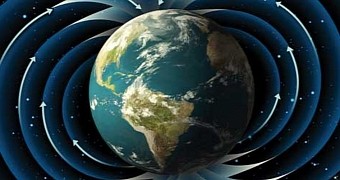Our planet is a wondrous place, and not in an oh-my-god-check-out-that-talking-tree kind of way. No Sir, it's awesome in a this-is-the-coolest-phenomenon-science-can-totally-explain sort of way. But don't take our word for granted, just keep reading to see for yourself.
A recent paper in the Geophysical Journal International argues that, according to evidence at hand, it is possible for our planet's magnetic field to flip in less than 100 years, which, thanks to advances in medicine, is now the equivalent of a human lifetime, give or take a few bad habits.
As explained by scientists with the University of California, Berkeley, in the US and their colleagues, having the Earth's magnetic field turn topsy-turvy boils down to waking up one morning to find that all the compasses in the world are pointing south instead of north. Freaky, right?
Mind you, it happened several times before
Writing in the Geophysical Journal International, the University of California, Berkeley scientists and fellow researchers explain that Earth is no stranger to having its magnetic field flip. On the contrary, this happened several times before.
By the looks of it, the last time our planet underwent such a drastic chance was about 786,000 years ago. The really weird part is that, apparently, this last magnetic reversal, dubbed the Matuyama-Brunhes transition, took place in under a century.
To documented how long it took our planet's magnetic field to reverse direction the last time this happened, the scientists behind this research project turned to analyzing ancient lake sediments discovered in the Apennine Mountains' Sulmona basin east of Rome, Italy.
The focus of this investigation was on documenting variations in the direction of the planet's magnetic field as indicated by how lake sediments were deposited at the bottom of the lake that covered this region many millennia ago.
The anatomy of the ancient lake sediments indicates that, prior to its complete reversal 786,000 years ago, Earth's magnetic field experienced a period of instability that lasted about 6,000 years and that included two intervals of oddly low magnetic field strength. These intervals each lasted 2,000 years.
As detailed in the Geophysical Journal International, the magnetic field flip per se appears to have happened sometime towards the end of the 2,000-year second interval of low magnetic field strength.
It will happen again, and fairly soon
The University of California, Berkeley researchers and colleagues say that the chief reason they decided to study this ancient phenomenon is that, as of recently, Earth's magnetic field has started acting up. More precisely, there is evidence that it is decreasing about 10 times faster than normal.
Some scientists believe that this is an indicator of the fact that, a few thousand years from now, it will once again turn topsy-turvy. However, at least at this time, it is impossible to say for sure when exactly this will happen.
A few thousand years might sound like a whole lot of time, but the fact of the matter is that, when compared to the age of the planet, it really isn't all that much. Hence the fact that some scientists are by no means shy about using the adverb “soon” when talking about this upcoming event.
Plenty of reasons to worry
Admittedly, nobody is going to fall off the planet and go on a joyride through space the next time Earth's magnetic field reverses. Still, specialists argue that there are plenty of reasons to worry about this phenomenon. Provided that we are still around to witness it, that is.
Long story short, they claim that such a reversal has high chances to wreak havoc on the global electrical system, essentially shutting it down. Besides, it might make it easier for cosmic rays and energetic particles to reach us. This would translate into an increase in global cancer rates.
For the time being, scientists cannot say for sure whether the next magnetic field reversal will happen as fast as the last one. Still, they argue that, given their findings, we would do well to invest some time and money in researching the potential effects of such an event in further detail.
As specialist Paul Renne put it, “We don’t know whether the next reversal will occur as suddenly as this one did, but we also don’t know that it won’t.” Furthermore, “We should be thinking more about what the biologic effects would be.”

 14 DAY TRIAL //
14 DAY TRIAL //